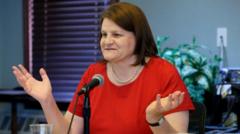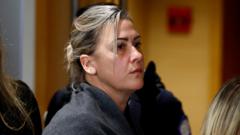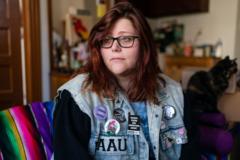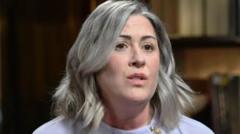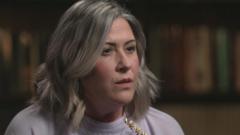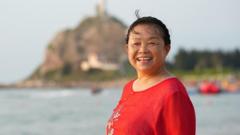**Caroline Darian, grappling with her own suspicions of abuse, seeks accountability for her father's actions that remain unaddressed.**
**Caroline Darian’s Struggle for Justice Beyond Her Mother’s Trial**

**Caroline Darian’s Struggle for Justice Beyond Her Mother’s Trial**
**A daughter's pursuit of truth amid her father's heinous crimes serves as a poignant reminder of unexplored pain in high-profile cases.**
The recent conviction of Dominique Pelicot and 50 other men for the systematic rape of his wife, Gisèle Pelicot, has not brought peace to the family. Caroline Darian, their daughter, whose pain and fears went unacknowledged during the high-profile trial, is left haunted by lingering questions of her own trauma.
As crowds celebrated the verdict outside the Avignon courthouse, overwhelming support poured in for Gisèle, who courageously stood as a symbol of the feminist movement in France. Yet, amidst the cheers, Caroline felt isolated in her own despair. The trial stemmed from horrific abuses suffered by her mother—where she was drugged and assaulted over a prolonged period—yet her daughter's allegations against her father received little attention during the proceedings.
Reflecting on the court's focus, Caroline, now 46, articulated her frustration: “It’s as if my case didn’t exist at all,” she remarked at a cafe near the famed Champs-Élysées in Paris. The public narrative celebrated her mother's bravery while Caroline was left grappling with her own accusations against Dominique, whom she believes subjected her to similar abuses.
Despite the charges and eventual convictions for the widespread abuses in the Pelicot household, Caroline's story remains tragically sidelined. She laments the court's limited probing into her father's actions towards her, resulting in a deepened emotional wound rather than the healing she so desperately sought after the trial's outcome.
As Caroline navigates this complex emotional landscape, her resilience highlights the need for broader conversations about the impacts of sexual violence, not just on the survivors but also on their families. In facing her father’s dark legacy, she seeks clarity—an accountability that goes beyond the headlines and acknowledges all victims, including those who have not yet found their voice.
As crowds celebrated the verdict outside the Avignon courthouse, overwhelming support poured in for Gisèle, who courageously stood as a symbol of the feminist movement in France. Yet, amidst the cheers, Caroline felt isolated in her own despair. The trial stemmed from horrific abuses suffered by her mother—where she was drugged and assaulted over a prolonged period—yet her daughter's allegations against her father received little attention during the proceedings.
Reflecting on the court's focus, Caroline, now 46, articulated her frustration: “It’s as if my case didn’t exist at all,” she remarked at a cafe near the famed Champs-Élysées in Paris. The public narrative celebrated her mother's bravery while Caroline was left grappling with her own accusations against Dominique, whom she believes subjected her to similar abuses.
Despite the charges and eventual convictions for the widespread abuses in the Pelicot household, Caroline's story remains tragically sidelined. She laments the court's limited probing into her father's actions towards her, resulting in a deepened emotional wound rather than the healing she so desperately sought after the trial's outcome.
As Caroline navigates this complex emotional landscape, her resilience highlights the need for broader conversations about the impacts of sexual violence, not just on the survivors but also on their families. In facing her father’s dark legacy, she seeks clarity—an accountability that goes beyond the headlines and acknowledges all victims, including those who have not yet found their voice.



